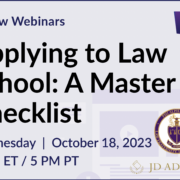LSAT Timing Tip: Start Timing Yourself Earlier!
 LSAT Timing Tip: Start timing yourself earlier! Often, students ask when they should start timing themselves on practice LSAT questions. Some people love being put under pressure immediately. They know that ultimately, their success on the exam is going to be based, in large part, on how efficiently they can answer questions. They are easily able to overlook the initial frustration, because they know that with time and repetition, they’ll have a better grasp on the questions and be able to answer them more quickly.
LSAT Timing Tip: Start timing yourself earlier! Often, students ask when they should start timing themselves on practice LSAT questions. Some people love being put under pressure immediately. They know that ultimately, their success on the exam is going to be based, in large part, on how efficiently they can answer questions. They are easily able to overlook the initial frustration, because they know that with time and repetition, they’ll have a better grasp on the questions and be able to answer them more quickly.
Others are more cautious. They move gently into preparations. And become more familiar with concepts before starting the clock and testing themselves. They do not want to be discouraged by initial failures. And, they like to feel very comfortable with questions before being timed.
Full disclosure: I was part of the second group. I liked to ease my way into new logic games. I liked to get a feel for them for a week (or two!) before starting the clock. When I first started preparing for the logical reasoning portion, I would take as long as I needed to figure out the question. Then I would check the answer. Then I would move on to the next question. In reading comprehension, I figured I would learn what the questions “felt” like. I would undergo a slow reading of some of the texts. This, I thought, would make future ones much easier to delve into. It just felt right to take time. I started studying early after all.
In hindsight, I know this approach did me more harm than good. While there’s certainly nothing wrong with becoming familiar with, say, how a linear game works before starting to keep track of your time, there is harm in waiting too long to start timing.
Indeed, waiting too long to start timing yourself after mastering the basics of a particular question set ignores a crucial part of successful LSAT preparation: the development of an internal clock.
The LSAT does allow analog watches into the testing center, but there is truly no replacement for the nagging little alarm in your head that tells you to move on in a test-taking situation. Exam stress profoundly affects both your critical thinking and time management skills. Some students are shocked by how much more time they use on test day for concepts they have mastered; those who timed themselves consistently while studying are much less prone to getting caught up on a particular question because their mind has been trained to know when to move on. Your internal clock is pivotal to finishing all the sections in a timely manner: the best way to develop it is to consistently time yourself during LSAT preparation.
So our LSAT timing tip of the day is to start timing yourself earlier!
Timing yourself also serves another important purpose. It lets you to see how far you have come! True, it can be frustrating in the beginning to spend seventy minutes on a section that should only take thirty-five. Timed questions, however, allow students to track and analyze their progress. I found it extremely satisfying to look back and see that a logic game question that used to take me ten or twelve minutes to finish eventually took me less than eight. Furthermore, it is much easier to tell if you are struggling with a concept if your timed sessions do not naturally shorten over time. If this is the case, additional tutoring or work can be dedicated to the trouble area. Without timing yourself, these types of issues might not ever become apparent.
So, for those who, like me, hated to rush into timed questions, fear not! The uncertainty and stress can initially be frustrating, but will ultimately pay off on test day.
Pursuing Law School? We’ve Got You Covered!
🌟 Special Offer: Enroll in our FREE on-demand law school prep course, meticulously crafted by a top-ranked law student. Secure your spot now






Comments are closed.